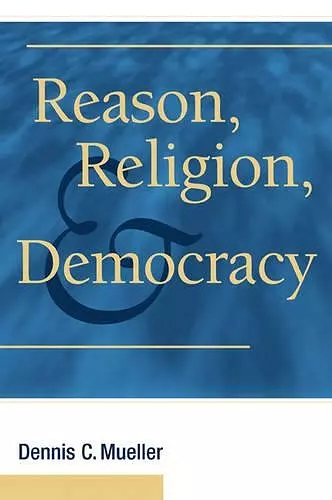Reason, Religion, and Democracy
Understanding the impact of extremism on liberal democratic values
Format:Paperback
Publisher:Cambridge University Press
Published:17th Aug '09
Currently unavailable, and unfortunately no date known when it will be back
This paperback is available in another edition too:
- Hardback£99.00(9780521115018)

This book examines the tension between faith and reason, focusing on how religious extremism challenges democratic institutions and individual freedoms.
In Reason, Religion, and Democracy, the author explores the intricate relationship between religion and science, emphasizing their differing approaches to understanding causal relationships. While both have their merits, the book highlights the significant challenge that religious extremism poses to liberal democratic institutions. This examination is particularly relevant in today’s world, where the clash between progressive values and extremist ideologies often leads to societal tensions.
The narrative delves into human psychology and the fundamental characteristics that define all religions. It presents a thoughtful contrast between the empirical nature of science and the faith-based framework of religion, illustrating how each serves as a system of thought. By employing historical sketches, the author effectively links the evolution of modernity with the human capacity for reasoning, advocating for its role in promoting human welfare and democratic values.
Additionally, Reason, Religion, and Democracy addresses the conditions necessary for democratic institutions to thrive, emphasizing the importance of constitutional rights in safeguarding individual freedoms. It underscores the threat posed by extremist religious movements to the fabric of liberal democracy, which has far-reaching implications for immigration policies, education, and the very definition of citizenship. Through this comprehensive analysis, the book invites readers to reflect on the delicate balance between faith and reason in contemporary society.
'Mueller's new book tackles a very large question and approaches it with a very broad, but very fine brush. The first half of the book provides a biological explanation for the origin of both reason and religion and explores how reason and religion have affected the development of civilization and have, in turn, been affected by those civilizations. The second half of the book links religion and rationality to issues in contemporary politics. It focuses on such issues as the relationship between education, religion, and democracy; the effects of emigration; and constitutional design. I am impressed by the book and with the project itself. I found myself broadly sympathetic with the book's arguments and conclusions, and even where I disagree, the arguments are interesting and provocative.' Roger Congleton, George Mason University
'In addition to a wide-ranging and insightful discussion of religion and its history, Dennis Mueller analyzes religious intolerance and its lack of correlation with liberal democracy. One of the lessons in the book is that a competitive, 'private' market in religion is an institutional means of keeping such intolerance in check. Monopoly in religion, like elsewhere, is not very forgiving. Mueller is well known for his work in other areas; he is a major economist. In my view this is his best book. Those of you who know his other works realize that this is a strong endorsement indeed.' Robert Tollison, Clemson University
'Dennis Mueller reworks enlightenment themes, offering a wide-ranging and provocative defense of the values of reason and liberal democracy and a critique of the role of religion: wide-ranging in terms of both ideas deployed and historical contexts considered; provocative in treating both religious fundamentalism of all forms and religious diversity as threats to liberal democracy.' Alan Hamlin, University of Manchester
'This is bound to be a controversial book. Mueller argues for consideration of restricted franchise – with only those 'with more education or loyalty to the state' forming the electorate. He questions the wisdom of the 'freedom to educate one's children as one pleases' and raises doubts about relatively open immigration policies. He underlines what he sees as a basic tension between religion (the 'antithesis of science') and liberal democracy. Above all, it is a courageous book, tackling difficult and tender questions about how the delicate balance between liberalism and democracy can best be managed. Not everyone will agree with his position. But everyone should agree that the challenges he points to are genuine and highly significant in the contemporary world.' Geoffrey Brennan, Australian National University
ISBN: 9780521132732
Dimensions: 230mm x 152mm x 24mm
Weight: 620g
460 pages